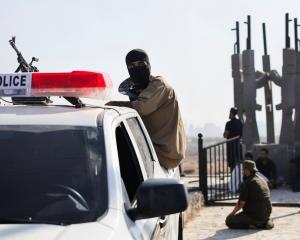
Triggered by road construction, the snarl-up began 10 days ago and was 100km long at one point. Reaching almost to the outskirts of Beijing, traffic still creeps along in fits and starts, and the crisis could last for another three weeks, authorities say.
It's a metaphor for a nation that sometimes chokes on its own breakneck growth.
In the worst-hit stretches of the road in northern China, drivers pass the time sitting in the shade of their immobilised trucks, playing cards, sleeping on the asphalt or bargaining with price-gouging food vendors.
Many of the trucks that carry fruit and vegetables are unrefrigerated, and the cargoes are assumed to be rotting.
On the eighth day of the near-standstill, trucks moved just 1km on the worst section, said Zhang Minghai, a traffic director in Zhangjiakou, a city about 150km northwest of Beijing.
China Central Television reported that some vehicles had been stuck for five days.
No portable toilets were set up along the highway, leaving only two apparent options - hike to a service area or into the fields.
But there were no reports of violent road rage, and the main complaint heard from drivers was about villagers on bicycles making a killing selling boxed lunches, bottled water to drink and heated water for noodles.

The traffic jam built up on the Beijing-Tibet highway, on a section that links the capital to the Chinese region of Inner Mongolia. The main reason traffic has increased on this partially four-lane highway is the opening of coal mines in the northwest, vital for the booming economy that this month surpassed Japan's in size and is now second only to America's.
Although wages remain generally low, vehicle ownership and gridlock have grown so commonplace that Inner Mongolia authorities restrict cars' movement to alternate days, based on odd or even numbers in their license plates.
The car invasion is widely felt; Guo Jifu, head of the Beijing Transportation Research Center, told a symposium this week that vehicles on Beijing's roads multiplied by 1900 per day on average in the first half of this year, Xinhua, the official news agency, reported.
The immediate cause of the traffic jam is construction on one of three southbound highways feeding into Beijing.
Authorities are trying to ease the snarl-up by letting more trucks into the capital, especially at night, said Zhang, the traffic director. They also asked trucking companies to suspend operations and advised drivers to take the few alternate routes available.
"Things are getting better and better," he said, but he added that the construction would go on until September 17.
Alan Pisarski, author of Commuting in America, said the worst traffic jams in US history tended to be associated with natural disasters, such as people fleeing Hurricane Katrina or the collapse of the upper deck of a freeway in Oakland, California, in the 1989 earthquake.
"It took some people days to get home after that one," Pisarski said.
Traffic arrangements built up over generations in the US are lacking in much of China, said Bob Honea, director of the University of Kansas Transportation Research Institute, who has visited China.
"We'll see this problem more and more often. It's true of every developing country," he said.
Honea said the US has never experienced a traffic jam as big as the one now bedeviling northern China, but he noted that traffic in Los Angeles "is pretty bad. It's not a highway, it's a parking lot."












